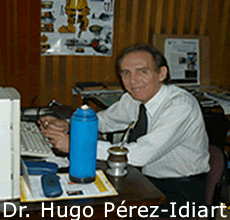
|
|||||||||||||||||||||||||||||
|
ON THIS SITE you will find links to my publications, syllabi from courses I have taught at Colegio Militar de la Nación Argentina, Universidad Católica de Salta, Universidad A. J. F. Kennedy, Universidad Abierta Interamericana, and additional information about my work. My research on interconnections among geocultural affairs, ethosocial security and global studies extending work reported in three of his earlier papers, namely “Análisis del Documento `Préparer les engagements de demain (2008)´, Ministère de la Défense, Republique Française”, ReDIU (Revista Universitaria del Colegio Militar), El Palomar, Bs. As., 2008; "Los global problems, las fronteras geoculturales y el lenguaje diasistémico. Abordaje de la violencia extrema en la hermenéutica de la complejidad en el País Vasco y Ruanda", 1ras. Jornadas Internacionales de Hermenéutica: "La hermenéutica, ¿un paradigma agotado? Texto, lenguaje, mundo", Facultad de Ciencias Sociales, UBA, Buenos Aires (6 al 9 de mayo 2009) and "Los global problems, el Islam y la violencia extrema" (ReDIU, CMN, El Palomar, Bs. as., 2010). The intellectual foundations and implementation strategy are reported in a book entitled Debates del Nuevo Siglo en las Relaciones Internacionales, Ed. Leuka, Buenos Aires, 2006, and so. You can find out more here. MY MAJOR AREAS of research and teaching interests include: international relations theories and international political methodology with a special focus on epistemology and theory of geocultural conflict and global cross-border issues, problems and studies; human security and environmental impacts of war and conflict; globalization and natural resource use; cross-border interaction and interconnectivity. If you have any questions, please send me an email.
I adopted the relativistic view to study, to understand, and cross-examine some global issues and problems. Yet, it is crucial to be cognizant of the fast-emerging emphasis in the social sciences on post-structuralist impressions of how geocultural conflicts, inter/transcultural relationship, extreme violence and so, have been affecting -and will increasingly influence- the trend toward complex international cross-border community. So, a dynamic view is determinist if knowledge of it and of the 'initial state' of a system is all we need to know to predict the 'future of the system'. Note that this is a matter of in principle. In chaotic determinism we cannot know the initial state of the system with sufficient precision to predict its future trajectory. Egipt is a case: "This is not simply a matter of idealism; it is a strategic necessity (...) Without genuine progress toward open and accountable political systems, the gap between people and their governments will grow , and instability will only deepen" (H. Clinton,The Washington Post, feb.5, 2011). But, the open system egyptian is under uncertainty. In other words the effect of two or more variable -as psycho-political, economic, and so- causes acting together is not simply the sum of their effects taken separately. Instead we find that there are complex emergent properties. As David Byrne (1998) said, one of the most important things about the approach is precisely its rejection of the validity of analytical strategies in which things are reducible to the sum of their parts. We are dealing with ‘emergent properties’ and must begin with a holistic statement. Instead of discussing modernity and post-modernity or micro versus macro predominant influences, I presume straightaway the complex interaction of all these tendencies. Also, my field of research deals with a methodological approach to the qualitative data and phenomena punctual. These could be repeated in diverse social or psychosocial settings. In this way, I am more interested in the robust aspects of chaos in the long term, which can be found within the chaotic order hidden within of daily activities.
|
|
|||||||||||||||||||||||||||||||||||||||||||||||
2011 - Subjects
Former - Subjects
|
|||||||||||||||||||||||||||||||||||||||||||||||||
|
|||||||||||||||||||||||||||||||||||||||||||||||||










